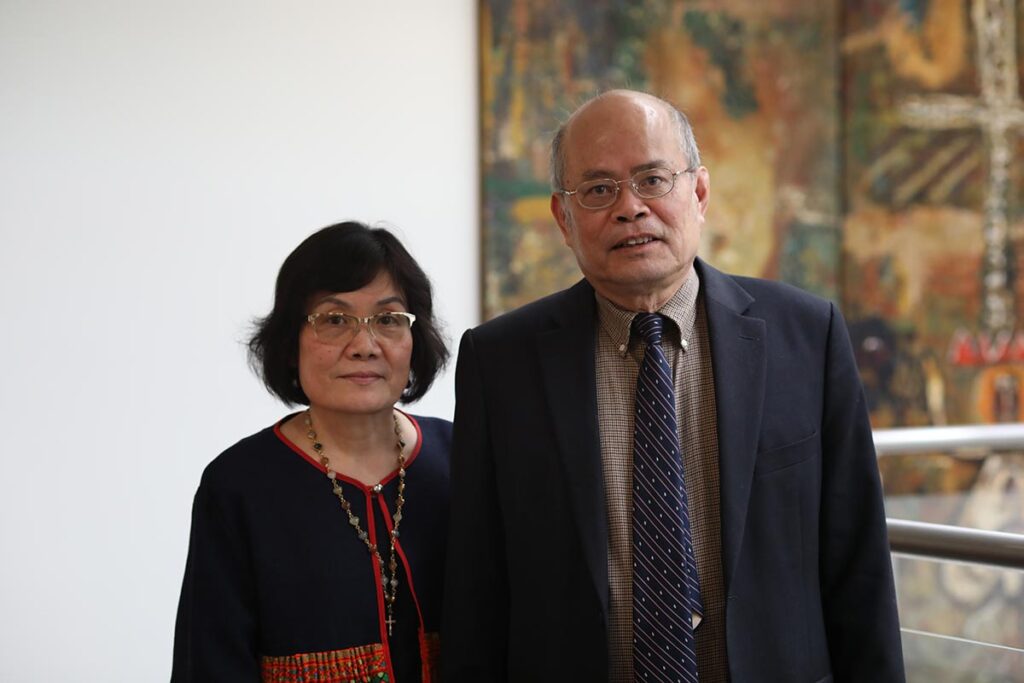Bridging Worlds in Faith and Service:
The Journey of Alums Rev. Dr. Pongsak and Monta Limthongviratn
By Rhiannon Koehler

When Rev. Dr. Pongsak Limthongviratn ThM ’91, PhD ’00 arrived at LSTC in 1989, he was stepping into more than a new academic chapter—he was stepping into a lifelong calling. At the time, he was one of only a handful of Thai scholars with an advanced theological degree. By the time he completed his PhD in systematic theology—becoming the first Protestant systematician in Thailand—he had already launched and organized the first Thai congregation in the ELCA, laid the groundwork for decades of intercultural ministry, and begun transforming how theology could be understood and lived across vastly different contexts.
Now President of the Bangkok Institute of Theology (BIT), Dr. Limthongviratn reflects on his path with humility, humor, and the fierce conviction that theology must remain relevant to the people it serves. “Theology cannot be only theory,” he says. “It must be practical. It must engage life.”
It’s a belief that has guided him through a remarkable career spanning continents. At LSTC, he studied under noted theologians Carl Braaten and Vítor Westhelle, experiences that shaped not only his intellectual trajectory but also his understanding of how confessional identity and contextual theology can live in constructive tension. “Braaten stood in the Lutheran tradition,” he recalls, “while Westhelle brought a different lens—rooted in the [lived realities of] the people.”
That interplay between tradition and experience defined much of Rev. Dr. Limthongviratn’s ministry. During his time as Director for Asian and Pacific Islander Ministries in the ELCA—a post he held for 25 years—he witnessed the denomination’s evolving approach to diversity, inclusion, and justice. “When I started, in 1997, diversity and issues of LGBTQ rights were already on the table,” he says. “But over time, it evolved. The ELCA grew from focusing on domestic and global mission work to focusing on social justice.”
Perhaps nowhere was this evolution clearer than in the Thai community Dr. Limthongviratn helped shepherd in his over two decades of pastoral work. What began as a small, loosely affiliated group grew into a vibrant, multilingual congregation with a six-figure budget and deep ELCA roots. “We were building bridges,” he reflects. That work—helping people feel seen, helping traditions come alive, has been foundational. “It has shaped everything I’ve done,” he said,
That commitment to contextual faith now animates his presidency at BIT, where he leads amid the complexities of Thai religious life, political polarization, and generational change. It hasn’t been easy. His progressive theological stances have drawn criticism from some corners of Thailand’s conservative Christian culture. Still, he remains steadfast: “I follow the way of Jesus,” he says, pointing to Christ’s humanity, his openness, and his love. “That is the way.”
Beside him in both life and vocation is Monta Limthongviratn, who earned her MA at LSTC in 2005. Today, Monta is a teacher, mother, and mentor whose own LSTC journey began in quiet uncertainty and grew into a powerful call.
“When I first came to Chicago, I wasn’t sure where I belonged,” she recalls. “I went to seminary, I tried nursing school, I worked at a preschool, I served as a pastor’s wife. But something kept pulling me back to Scripture.”
Encouraged by fellow Thai women in the community—and her own deep love of stories—Monta returned to seminary. Her studies with Professor Esther Menn affirmed what she had always known intuitively: that biblical stories speak to our lives not just through doctrine, but through narrative.
“I’ve always loved novels,” she laughs. “And I love the Old Testament because it’s full of people. Through their stories, we learn how God is present.”
Today, she teaches Old Testament courses at BIT, where her classroom overflows not only with ideas but with hospitality. She allows her students to share food, she creates space for laughter and reflection and connects with her students through storytelling. “For some students, maybe the first couple of years of seminary, they won’t like it,” she recalls, thinking of the many different conditions that can drive students to seminary in Thailand “But after they start learning the stories…their minds can be inspired to find God.”
Monta is a role model for women in Thai theological education, a presence that’s still too rare. Together, Pongsak and Monta have built lives rooted in service, scholarship, and faith. Their journey—across cultures, denominations, and decades—embodies the heart of LSTC’s mission: to prepare leaders who not only study theology, but who boldly live it out in the world.